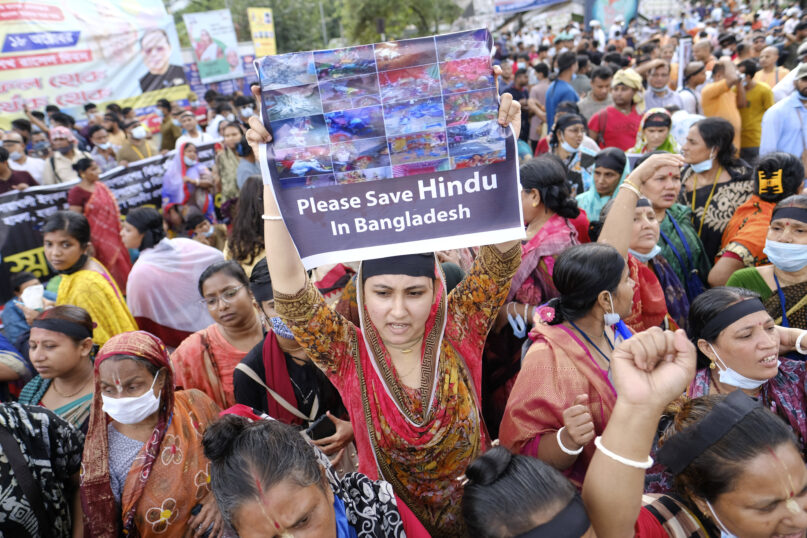(RNS) — After angry crowds closed in on the prime minister’s official residence in Dhaka on Monday (Aug. 5), forcing Bangladesh’s leader, Sheikh Hasina, to resign her office after 15 years and flee to India, the ire of the protesters around the Muslim-majority country turned to the minority Hindu population.
Hindus, who make up about 8% of Bangladesh’s population, have been targets of political violence since Bangladesh, then East Pakistan, moved to break away from West Pakistan in 1971. That year, as part of an effort to stop the independence movement, Pakistani forces and pro-Pakistan militias killed as many as 3 million people, most of them Hindus, in a genocidal rampage.
In recent years, Hindus have been subject to rape, murder and the burning of their temples and have been singled out for supporting Hasina’s political party, the Awami League, which was seen as a more secular alternative to the country’s opposing political parties. Most of those parties are Islamist and include Hasina’s main rival, the Bangladesh Nationalist Party, which traces its genesis to the ruling elites that ran Bangladesh when it was controlled by Pakistan.
At the heart of the protests is the favoritism in hiring for government jobs allotted to the families of those who fought against Pakistan in the war for independence or for those who had suffered losses in the war. Students in particular called for the end to the quotas, which they claimed had become little more than a patronage program for supporters of the Awami League.
Hindu loyalty to the Awami League, political observers say, is overstated — attacks on Hindus have continued unabated under Hasina’s regime. But Bangladesh’s Muslim leadership had been increasingly suspicious of the close ties that had developed between Hasina and Indian Prime Minister Narendra Modi, whose government has been accused of being hostile to India’s Muslims. Hasina and Modi worked to increase trade between their two nations, continuing a history of warm ties.
As a result, the far-right Bangladeshi opposition parties have come to view Hindus as agents of India, not entirely dissimilar to the distrust far-right Indians have toward Indian Muslims, some of whom have been accused of allegiance to Pakistan.
Some of the student protesters in the recent clashes, as well as members of the Bangladeshi diaspora who support the protests, have pleaded for the violence against Hindus to stop, and in some cases, local Bangladesh Muslims have taken it upon themselves to protect Hindu neighbors, with mixed results.
As chaos continues to spread, whole families of Hindus have been murdered and their houses of worship looted. These and other acts of terror have compelled Hindus to flee to India. The interim leader appointed by Bangladesh’s president, Nobel Peace Prize-winner Muhammad Yunus, has joined the student protest leaders in condemning the attacks, but volunteer student and village patrols can’t protect Hindus for much longer without some form of official intervention or protection.
Meanwhile, human rights organizations have become particularly concerned that the power vacuum could soon be filled by Islamist parties that have more organization and mobilization abilities than the student protesters.
While the world continues to monitor the Israel-Gaza conflict, the Ukraine-Russia war and anti-immigrant riots in the United Kingdom, human rights advocates and concerned nations, which includes the United States, as well as Bangladesh’s neighbors India and China, need to work to ensure that Bangladesh doesn’t become home to another humanitarian crisis and genocide.
(Murali Balaji is a journalist and a lecturer at the Annenberg School for Communication at the University of Pennsylvania. The views expressed in this commentary do not necessarily reflect those of Religion News Service.)





